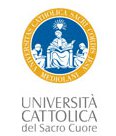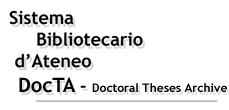|
|
DocTA - Doctoral Theses Archive >
Tesi di dottorato >
SCUOLA DI DOTTORATO IN STUDI UMANISTICI. TRADIZIONE E CONTEMPORANEITA' >
Citazione:
Utilizza queste indicazioni per citare o creare un link a questo documento.
|
Loddo, Rita Laura. "IL VOLTO DEMOCRATICO DI SOLONE? ANALISI DEL CORPUS DI LEGGI SOLONIANO", Università Cattolica del Sacro Cuore, XXVI ciclo, a.a. 2013/14, Milano, [http://hdl.handle.net/10280/6141].
|
| Titolo: | IL VOLTO DEMOCRATICO DI SOLONE? ANALISI DEL CORPUS DI LEGGI SOLONIANO |
| Autore/i: | LODDO, RITA LAURA |
| Tutor: | BEARZOT, CINZIA SUSANNA |
| Coordinatore: | BEARZOT, CINZIA SUSANNA |
| Lingua: | ITA |
| Abstract in italiano della tesi: | Oggetto della tesi è lo studio del “Solone democratico”, di cui si ricostruisce la genesi attraverso le testimonianze degli antichi e le riflessioni dei moderni. Per sottoporre a verifica l’affermazione aristotelica che riconduce a Solone l’origine della democrazia, sono state prese in considerazione primariamente quelle misure che riguardano la costituzione (Eliea, bulé dei Quattrocento, accesso alle cariche), al fine di comprendere se il giudizio degli antichi si basò su una valutazione condivisibile dell’azione del legislatore. Si sono ritenute ugualmente indicative, a questo scopo, alcune leggi ordinarie attribuite a Solone (legge sull’inattività, legislazione funeraria, leggi sulle donne, legislazione assistenziale): di queste leggi si è indagata l’origine soloniana e la compatibilità con il resto della legislazione dell’Ateniese a partire dalla valutazione del loro significato. La tesi è completata da tre appendici che sviluppano alcuni dei temi emersi nel corso dell’indagine e considerati meritevoli di approfondimento: si tratta della questione procedurale nella legge sull’inattività; della datazione e del commento di una legge funeraria concernente alcuni obblighi del demarco; della connessione fra Solone e l’Areopago. |
| Abstract in inglese: | The aim of this thesis is the study of the “democratic Solon”, whose genesis has been reconstructed through the ancients’ accounts and the works of modern scholars. To test the Aristotelian statement that traces the origin of democracy to Solon, we have primarily considered those measures that concern the constitution (Heliaia, boule of the Four Hundred, access to high offices), in order to understand if the ancients’ judgement was based on a shareable assessment of the legislator action. For that purpose some ordinary laws attributed to Solon - on idleness, on women, funerary and welfare laws - have been considered equally indicative. Of these laws it has been investigated the Solonian origin and compatibility with the rest of the Solonian legislation, starting from an assessment of their meaning. To complement the present thesis there are three appendixes which develop some of the themes that arose during the investigation and that have been considered worth to be deepened. It is the case of the procedural question regarding the law on idleness; the dating and comment of a funerary law concerning some duties of the demarch; of the connection between Solon and the Areopagos. |
| Data di discussione: | 17-mar-2015 |
| URI: | http://hdl.handle.net/10280/6141 |
| È visualizzato nelle collezioni: | SCUOLA DI DOTTORATO IN STUDI UMANISTICI. TRADIZIONE E CONTEMPORANEITA'
FACOLTA' DI LETTERE E FILOSOFIA
|
File in questo documento:
| File |
Dimensioni | Formato | Accessibilità |
|---|
| Introduzione.pdf | 154,99 kB | Adobe PDF | Visualizza/apri
|
| Tesi dottorato LODDO.pdf | 3,42 MB | Adobe PDF | non consultabile
|
| frontespizio.pdf | 99,56 kB | Adobe PDF | non consultabile
|
| Indice Tesi Loddo.pdf | 95,6 kB | Adobe PDF | Visualizza/apri
|
|
Accesso e utilizzo dei contenuti di DocTA
|



